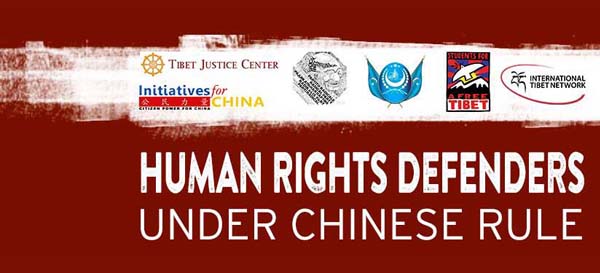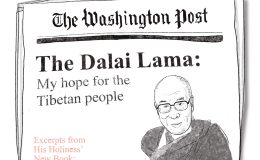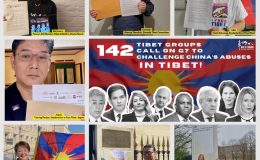Tibet Advocacy Coalition (Tibet Justice Center, Students for a Free Tibet, International Tibet Network)
Thursday 19 June, UN Geneva
Calling China out over its treatment of Tibetan, Uyghur and Han human rights defenders; Urging world’s states to support release of prisoners, and UN expert visits.
As the next step in our strategic engagement at the UN, the Tibet Advocacy Coalition (Tibet Justice Center, Students for a Free Tibet and International Tibet Network) gathered a stellar group of speakers at a side event at the 26th regular session of the UN Human Rights Council in Geneva in collaboration with the World Uyghur Congress and Initiatives for China, to draw attention to deteriorating situation for human rights defenders2 under Chinese rule, and to add further weight to there being concrete, multilateral action by states towards China on Tibet.
The situation for human rights defenders under Chinese rule has become increasingly dangerous, with rising rates of criminalisation (false criminal accusations against defenders), arbitrary detention, house arrest, and other forms of harassment of defenders. The high profile death in Chinese detention this March of Han human rights defender Cao Shunli, who was arrested when trying to attend a human rights training at the UN in Geneva on China’s UPR, brought this issue to the fore. The time was now for an urgent discussion on the issue, and we seized the moment to raise concern about individual human rights defenders from the Tibetan, Uyghur and Han communities.
Pierre Hegay from Unrepresented Nations and Peoples’ Organisation (UNPO) opened the event by giving an overview of the situation for human rights defenders under Chinese rule. He noted that China’s policies and practices at times directly violate human rights and at other times create the conditions in which human rights can be violated with impunity. Pierre noted that such a situation means that human rights defenders work at great risk, and highlighted as an example Cao Shunli’s recent death in Chinese detention. He urged the UN human rights bodies and members states to work together to better support human rights defenders working under Chinese rule.
Padma Dolma, Europe and Campaigns Director of Students for a Free Tibet (a Tibet Advocacy Coalition member) spoke about the situation in Tibet for defenders. She highlighted the cases of Tenzin Delek Rinpoche and Khenpo Kartse both of whom were arrested for the work they were doing in the community, for the passion they had to help their people and keep their culture alive.
Khenpo Kartse was a strong advocate for Tibetan language rights, and both he and Tenzin Delek Rinpoche promoted Tibetan culture practices. Padma Dolma said “Khenpo Kartse is currently held in a prison in Chamdo and is in a rapidly deteriorating health condition…[and, Tenzin Delek Rinpoche] has now been a political prisoner for over 12 years…I ask you to recommit yourself to use all your diplomatic tools available in order to secure the release of these two Tibetan Human Rights Defenders and all the other ones they represent”.
Rebiya Kadeer, the world’s most famous Uyghur activist, spoke about the situation for Uyghur defender Ilham Tohti, a prominent Beijingbased Uyghur scholar arrested in January 2014 and recently handed a heavy sentence. Ms. Kadeer said emphatically, ”China must respect the rights of the Uyghur people. Respect our rights, culture, language and religion. Then you can ask us if we want to be part of China.”.
The Chinese government officials who attended the event responded by accusing the panel of providing “laughable and false allegations”. They appeared to be insinuating that the panellists were tantamount to separatists or even terrorists. In October 2013, the Chinese government had denied the existence of human rights defenders in China during China’s Universal Periodic Review (a prominent UN human rights review). True to this government line, one official today said, “I laugh because individuals like you believe Liu Xiaobo is a human rights defender!”
Jamyang Tsultrim, Director of Filming for Tibet, Tibetan expolitical prisoner, and cousin to recentlyreleased political prisoner Dhondup Wangchen, spoke directly from his firsthand experience to the Chinese representatives present: “You cannot continue to repress the [Tibetan, Uyghur and Han] people who want freedom!”.
It is a testament to the continuing strength of the UN that such an event could happen there. It also highlights the uncomfortable truth that whilst Tibetan, Uyghur and Han activists could join the panel and speak freely in Geneva, if they had done so in China they would be facing arrest, prison sentences and torture. It is clear that change needs to happen, and UN member states need to play their part in pushing for that change.
The panelists presented a briefing paper to the attendees with a list of recommendations for what they could press China on for real, tangible change in support of human rights defenders, as below:
Recommendations
We urge China to:
- Release Ilham Tohti, Karma Tsewang, Tenzin Delek Rinpoche, Ding Jiaxi, Zhao Changqing and all other human rights defenders held in detention in the People’s Republic of China;
- Allow an official visit from the Special Rapporteur for Human Rights Defenders, and engage openly with other Special Procedures of the Human Rights Council;
- Bring national laws and practices affecting human rights defenders in line with international standards, including, inter alia, the UN Basic Principles on the Role of Lawyers, the International Covenant on Civil and Political Rights (ICCPR), Universal Declaration on Human Rights, and the UN Declaration on Human Rights Defenders;
- Urgently set a date for the UN High Commissioner for Human Rights to visit China, including unfettered access to all Tibetan and Uyghur areas, as agreed to in the 2013 UPR process.
- Investigate all allegations of torture in custody, including those raised by alleged victims or their lawyers, provide proper redress and compensation to victims of torture, and end the impunity of officials who engage in torture and other illtreatment, including by implementing the necessary institutional reforms to ensure effective enforcement of existing laws prohibiting torture.
We urge the United Nations Human Rights Council to:
- Urge China to respect internationally recognised obligations to protect human rights defenders, including those enshrined within the Universal Declaration on Human Rights Defenders.
- Call on China to stop the criminalisation, illegal and arbitrary detention, enforced disappearance, and other forms of intimidation and harassment of human rights defenders within its borders, including in Tibetan areas and Uyghur areas.
- Call on China to allow all individuals to peacefully exercise their rights, including those to freedom of expression, association and assembly, religion and belief.
- Urge China to set a date for the UN High Commissioner for Human Rights to visit China as agreed to in the 2013 UPR process, including unfettered access to Tibetan and Uyghur areas.
- Urge China to ensure that Ilham Tohti, Karma Tsewang, Tenzin Delek Rinpoche, Ding Jiaxi, Zhao Changqing and all other human rights defenders in detention are immediately released.
- Call on China to allow an official visit by the UN Special Rapporteur on Human Rights Defenders, including to Tibetan and Uyghur areas.
- Urge China to investigate all allegations of torture in custody, including those raised by alleged victims or their lawyers, provide proper redress and compensation to victims of torture, and end the impunity of officials who engage in torture and other illtreatment, including by implementing the necessary institutional reforms to ensure effective enforcement of existing laws prohibiting torture.
———-
- UN side events can be high profile tools for raising awareness and persuading UN members states to take action on issues.
- Human rights defenders are defined as individuals who nonviolently work for human rights, from the protection of language rights, to religious expression and cultural rights. They are often abused and silenced by human rights violators, including states.





